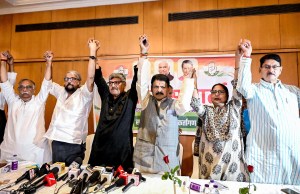Bowlers’ behaviour under ICC scanner
The International Cricket Council (ICC) is using the triangular series involving India, Sri Lanka and West Indies as part of its “clean...

The International Cricket Council (ICC) is using the triangular series involving India, Sri Lanka and West Indies as part of its “cleaning up act” of bowlers behaviour as a long-term prelude to CWC07.
India’s Ashish Nehra and Sri Lanka’s Faveez Maharoof have been found guilty of breaches of the ICC code of conduct clause 1.5 on successive nights at the Indian Oil Cup triangular series.
While Mike Procter has remained tight-lipped over the issue, Australian umpires Simon Taufel and Daryl Harper, it is understood, have been told to get the bowlers to turn to the umpires and make appeals instead of “celebrating a dismissal”.
Although not an official law at this stage, umpires have long contended that under Law 42, fair and unfair play, bowlers need to show courtesy as part of the game’s code of ethics.
A meeting involving elite umpire panelists and match referees and Malcolm Speed, the ICC’s chief executive highlighted how bowlers were trying to “take on or force umpires into making erroneous decisions” through such actions. As this was against the spirit of the game, it was time the ICC put an end to such acts.
Fiery West Indies fast bowler Tino Best, as an example, is under a final warning over bowling beamers in the Test series against Sri Lanka. A beamer bowled in any of the triangular series would see him banned from the tournament and possibly from another series.
Unconfirmed ICC reports suggest that match referees have issued warnings to captains of both sides to remind their bowlers of the code of ethics or face the penalties.



- 01
- 02
- 03
- 04
- 05




























